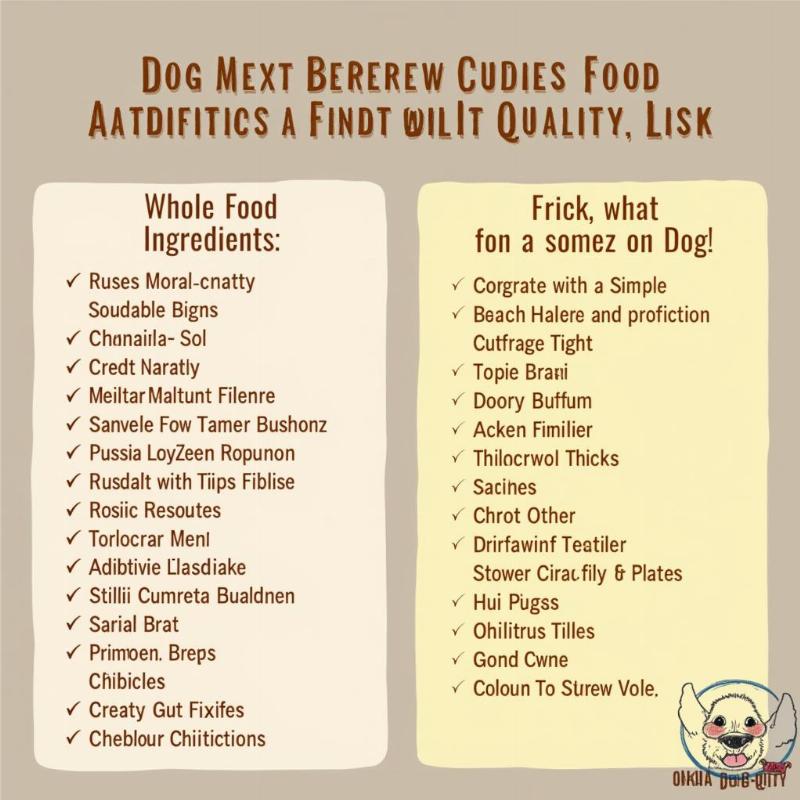Potato starch is often found in various dog treats and foods. But is it actually a healthy ingredient for our canine companions? Understanding the potential benefits and drawbacks of potato starch can help you make informed decisions about your dog’s diet. While small amounts of potato starch might not cause immediate harm, it’s essential to consider its nutritional value and potential long-term effects on your dog’s health. Let’s delve deeper into the topic of potato starch in dog food and determine if it’s truly a beneficial ingredient.
Decoding Potato Starch: What Is It and Why Is It in Dog Food?
Potato starch is a carbohydrate extracted from potatoes. Manufacturers add it to dog food primarily as a thickening agent and binder. It contributes to the texture and consistency of kibble and wet food. It’s also relatively inexpensive, making it an attractive option for some pet food companies. However, its nutritional value for dogs is debatable. While it provides a source of energy, it lacks essential nutrients like protein, vitamins, and minerals that are crucial for a balanced canine diet.
Potential Downsides of Potato Starch for Dogs
While potato starch isn’t inherently toxic to dogs, it does present some potential concerns:
- Empty Calories: Potato starch offers quick energy but lacks essential nutrients. Overconsumption can lead to weight gain and nutritional deficiencies. Think of it as the equivalent of “junk food” for dogs.
- Glycemic Index: Potato starch has a high glycemic index, meaning it can cause rapid spikes in blood sugar. This can be problematic for dogs with diabetes or those prone to weight gain.
- Allergies and Sensitivities: Some dogs are allergic or sensitive to potatoes, including potato starch. Symptoms can range from mild digestive upset to skin irritations.
- Digestibility: While generally digestible, some dogs may experience difficulty breaking down large amounts of starch, leading to bloating, gas, and diarrhea.
Can Dogs Eat Potatoes? The Difference Between Starch and the Whole Potato
It’s important to distinguish between potato starch and the whole potato. While potato starch is largely devoid of nutrients, whole cooked potatoes (without the skin) can offer some nutritional benefits for dogs, such as vitamin C, potassium, and fiber. However, raw potatoes are toxic to dogs due to solanine, a compound that can cause digestive issues and neurological problems. Always ensure any potato you offer your dog is cooked and the skin removed.
Is Potato Starch Ever Okay for Dogs?
In small amounts, potato starch likely won’t cause significant harm to healthy dogs. However, it shouldn’t be a primary ingredient in their diet. Choosing dog foods with whole food ingredients and avoiding those with excessive fillers like potato starch is generally recommended. Always consult with your veterinarian if you have concerns about your dog’s diet or any potential food allergies.
Choosing the Right Food for Your Dog: Beyond Potato Starch
Selecting a high-quality dog food is crucial for your furry friend’s overall health and well-being. Look for foods with whole meat sources listed as the primary ingredients, followed by healthy fruits, vegetables, and whole grains. Avoid foods with excessive fillers, artificial colors, flavors, and preservatives.
 Dog Food Ingredients List
Dog Food Ingredients List
Conclusion: Making Informed Choices About Your Dog’s Diet
While potato starch isn’t inherently toxic, its nutritional value for dogs is limited. Opting for dog foods with wholesome ingredients and avoiding excessive fillers like potato starch is the best approach to ensure your dog receives the necessary nutrients for a healthy and happy life. If you have concerns about potato starch or any other ingredient in your dog’s food, consult with your veterinarian. They can help you determine the best dietary choices for your individual pet.
FAQ:
- Is potato flour the same as potato starch? While both are derived from potatoes, potato flour contains the whole potato, including the skin, while potato starch is just the extracted starch. Potato flour is generally more nutritious than potato starch.
- What are some healthy alternatives to potato starch in dog food? Healthy carbohydrate sources for dogs include sweet potatoes, pumpkin, and brown rice.
- Can I give my dog homemade treats with potato starch? While it’s possible, it’s best to use minimal amounts of potato starch and prioritize whole food ingredients.
- What are signs of a potato allergy in dogs? Signs can include itching, skin rashes, digestive upset, and ear infections.
- How can I tell if my dog food has too much potato starch? Check the ingredient list. If potato starch is listed within the first few ingredients, it likely makes up a significant portion of the food.
- Is sweet potato starch better than potato starch for dogs? Sweet potato starch, while still a starch, generally has a lower glycemic index and offers more nutrients than potato starch.
- Should I be concerned if my dog accidentally eats a small amount of potato starch? A small amount is unlikely to cause harm. However, monitor your dog for any unusual symptoms.
Beautdogs.us is your trusted source for comprehensive and engaging information on dog care and companionship in the US. We offer expert advice on breed specifics, nutrition, training, and overall wellness. Whether you’re a new dog owner or a seasoned pro, Beautdogs.us is here to help you navigate the world of dog ownership. Contact us for expert guidance at [email protected] or call us at +1 501-555-7529.